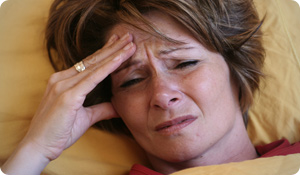
Women are already more prone to insomnia and other sleep disturbances than men, then menopause kicks in and, for many women, it only gets worse. In many cases, midlife insomnia has little to do with menopause, however, but may be attributed to sleep disorders and other medical conditions. That's the bad news. The good news? Getting the right diagnosis-and the right treatment-can get you a better night's sleep.
Most women in the premenopausal stage of perimenopause, as well as those who have reached menopause, experience what are called vasomotor symptoms, including hot flashes, or sudden feelings of warmth in face, neck and chest area, as well as daytime and nighttime sweats. These symptoms may occur only occasionally or many times throughout the day and night. Night sweats can be so intense that some women find themselves waking up on soaking wet pillows and sheets. Besides the temporary rise in body temperature, and the chill that often follows, having to get up to change your bedding, find a dry spot, or move to the couch is sure to cause an extended disruption in sleep.
Not all women are bothered by these temperature changes, however, even when they occur frequently. But in a study published in a 2008 issue of the journal Menopause, researchers from the University of Pittsburgh School of Medicine found that among women who experience hot flashes and night sweats, those who experience sleep problems find them most bothersome.
But a study performed at Wayne State University School of Medicine, published in a 2007 issue of Menopause, showed that menopausal symptoms are not always responsible for loss of sleep. The researchers found that out of 102 women ages 44 to 56, 31 had periodic limb movements, 23 had sleep apnea, and six of the women had both of these sleep disorders. There may be a connection between sleep disorders, such as sleep apnea, and menopause because, in women, the disorder is more likely to develop as they enter this stage of life. Treating the symptoms of menopause, however, will not treat underlying sleep disorders that are the cause of interrupted sleep.
Women who are nearing menopause but not experiencing any type of vasomotor symptoms or sleep disorders may still suffer from sleep problems. Other physical and mental health issues, such as depression, anxiety, joint pain, heartburn and other gastrointestinal disorders, often develop around the same time as menopause, and can interrupt normal sleep patterns. Also, sleep patterns naturally change as you age and that alone could be responsible for irregular sleep.
If you are between the ages of 40 and 60 and experiencing sleep difficulties, speak with your primary care physician or gynecologist. The first step to getting appropriate treatment is to determine what is actually causing you to lose sleep.
Sources:
Freedman, R, Roehrs, T, "Sleep Disturbance in Menopause." Menopause Sep/Oct 2007; 14(5): 826-829. Web. 28 Sep 2010.
http://journals.lww.com/menopausejournal/Abstract/2007/14050/Sleep_disturbance_in_menopause.7.aspx
Harvard Health Publications. "Perimenopause: Rocky Road to Menopause." Aug 2005. Web. 28 Sep 2010.
National Heart, Lung and Blood Institute. "Who is at Risk for Sleep Apnea?" Web. 28 Sep 2010. http://www.nhlbi.nih.gov/health/dci/Diseases/SleepApnea/SleepApnea_WhoIsAtRisk.html
National Women's Health Information Center. "Menopause." 1 Feb 2008. Web. 28 Sep 2010.
http://www.womenshealth.gov/faq/menopause-treatment.cfm#b
Thurston, R. et al. "Beyond Frequency: Who is Most Bothered by Vasomotor Symptoms?" Menopause. Sep/Oct 2008; 15(5): 841-847. Web. 28 Sep 2010.
http://www.ncbi.nlm.nih.gov/pmc/articles/PMC2866103/





